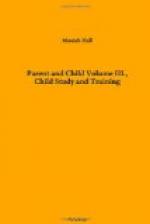“But what shall be done when more serious offences are committed?” The parent may well ask. In all likelihood there will be no serious offences if the slight ones are treated properly. A mother came to me with her face full of suppressed suffering. “What shall I do?” she remarked, “I have discovered that my boy steals money from his father’s purse.” “Give him a purse of his own,” I answered, “and give him ways of earning money of his own.” It is asserted that more than half the boys sent to reform schools go there because of theft. How many of them might have been saved if they had been taught how to earn and to know the value of an honest dollar?
But so long as human nature is imperfect, and frailty so common, we must expect in every family some occasion to arise that will tax the patience and the love of the parent to the uttermost. No rule can be given that will meet every crisis; common sense, justice, forbearance, faith and love may be used in vain; and reproof, censure, and corporal punishment may also fail in some supreme emergency, the only recourse that remains after all these are exhausted is to permit the natural consequences of the deed to fall upon the head of the transgressor.
Rule: Parents should rarely punish the child, but should permit the consequences of carelessness and wrong-doing to fall upon his own head. Wisdom results from suffering pains and taking pains.
LESSON XVII
QUESTIONS FOR DISCUSSION
1. Why do evil consequences follow bad deeds?
2. In what sense are nature’s punishments kind?
3. What two mistakes are common in child government?
4. Illustrate how natural punishment may be employed by parents.
5. What may be resorted to in serious cases? For further discussion and study of this subject the following references will be found helpful:
1. Chapter on Moral Education, from Spencer’s “Education.”
2. “Dealing with Moral Crises,” by Cope, from “Religious Education in the Family.”
3. “Misunderstood Children,” by Harrison.
ADOLESCENCE
The Adolescent Period Is a Time of “Storm and Stress,” When the Chief Crises of Life Arise
Most writers on psychology recognize in the life history of the child several more or less distinct periods of development. The child is almost a different being at different levels of his growth. Each period is marked by peculiar physical, mental and moral characteristics which demand specific treatment. So great and sudden are some of these changes that they are sometimes likened to a metamorphosis, indicating an analogy with certain insects as a change from the larvae and pupae stages to that of butterflies.
Space will not permit more than a brief account of the most critical of these periods, namely, the adolescent. This period begins at about the age of thirteen in girls and fourteen in boys, and continues until about eighteen. Physically, this stage starts with a very rapid growth which is frequently doubled in rate within a single year. The girl may, in a few months, change from a tall, angular, romping tomboy into a blooming, dimpled young woman, bashful and afraid.




